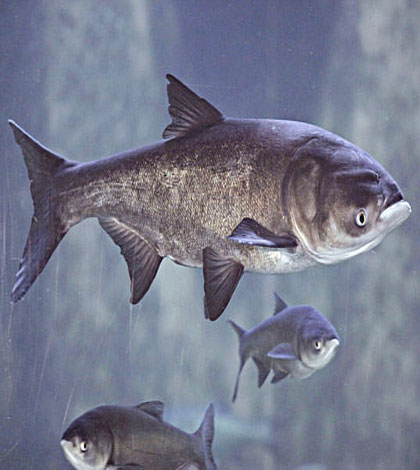MANITOULIN—Toronto city councillors want the federal and provincial governments to help keep Asian carp out of Lake Ontario and other Great Lakes tributaries, and this has received the support of the chair of the United Fish and Game Clubs of Manitoulin (UFGCM) and the Ontario Federation of Anglers and Hunters (OFAH).
“This is a good way and the most recent attempt to keep the importance of preventing Asian carp out of the Great Lakes in the forefront, publicly and in front of the decision makers (politicians),” said Dr. Terry Quinney, provincial manager of fish and wildlife services with the OFAH.
“Yes, it would be great if they could keep Asian carp out of all the Great Lakes—they would be devastating to the fisheries,” said Jim Sloss, chair of the UFGCM.
The Toronto Sun had reported in its July 12, 2013 edition that two Toronto city councillors had gone fishing at Ashbridges Bay Park earlier this month to raise awareness of a motion they would be putting forward at the council meeting July 16-17. The councillors have sent a letter to both the federal and provincial environment ministers calling on them to work with the United States Army Corps of Engineers, currently at work on a plan to swiftly find a solution to fight off the invasive Asian carp species.
Mike Layton told the Sun the two governments “need to work closely with our neighbours to ensure we take coordinated, swift action against this threat.”
If Asian carp hit Ontario waters experts say they will eat the food supply that our native fish depend on and threaten the $7 billion sport and commercial fishery industry, as well as the boating and tourism industry.
Nancy Goucher of Environmental Defence told the Sun that Asian carp eat the bottom of the food chain which in turn “steals” food from native fish species. “They reproduce like crazy and they can easily take over ecosystems,” she said. She explained that Environmental Defence wants Canadian governments to encourage our US counterparts to permanently close off the man-made links between the Mississippi River Basin and the Great Lakes.
Mr. Quinney told the Sun about two million people love to go fishing, which has a huge economic impact. “That’s what’s at stake here in Ontario alone, because they will out-compete the existing fish species that we find so valuable. They will harm them and once they’re established, it’s virtually impossible to eradicate them.”
“We are not going to be critical of the (new Environmental Defence) report,” Mr. Quinney told the Recorder. “There continues to be momentum in focusing and talk about problems on the Great Lakes with Asian carp and other invasive species. If the carp reach our waters it will remove the benefits of our fisheries and replace this on both sides of the border with costs. We would lose all benefits and there would be increased costs in trying to get rid of the carp and maintain our fisheries.”
“The Asian carp are extremely important in anglers point of view because of their negative effects,” said Mr. Quinney. “My professional opinion is that across the Great Lakes Basin it would have been more timely to have this report published a year ago, as a number of questions and recommendations made in it are already being addressed with strict rules in place. The report does not give enough credit to the federal and provincial governments in terms of cross border enforcement that has been put in place in keeping Asian carp out of our waters. One recommendation was for increased fines for those bringing live carp into Canada and this is in place. The Canadian Border Services with MNR enforcement officials have done a very good job stopping the illegal importation of live Asian carp at the borders.”
However, “the new report definitely has value,” said Mr. Quinney. “The authors of the report bring out the idea that more public education concerning the problem of Asian carp needs to get out, it is very important and needs to be done locally, provincially and Canada-wide.”
“We know the Canadian government will soon be passing laws banning the importation and transportation of live Asian carp across Canada,” continued Mr. Quinney. “This is a law Ontario has had in place for the past several years and no doubt will help in preventing the spread of Asian carp. And there have been recommendations Canada could do the same at its borders, particularly in Quebec where we’ve been fearful of inter-provincial transportation of live Asian carp.”
“Credit the Harper government for being willing to put these measures in place, and this is good news,” said Mr. Quinney. He said it is interesting how creative people have been in attempting to get Asian carp across borders.
“Asian carp can survive out of water for an extended period of time and what has been found is some shipments have been stopped at the borders, with shippers saying they don’t have live Asian carp. However, border officers and MNR personnel will look at these so-called dead carp and put them in water and they are revived. Because of this Ontario will tweak these laws to only allow dead, gutted Asian carp over the border. This is all very good news.”
In a letter to Toronto City council on behalf of the OFAH, Mr. Quinney wrote, “On behalf of the more than 100,000 members, subscribers and supporters of the OFAH, I am writing to support the intent of the motion protecting the Great Lakes from Asian carp,” moved by Councillor Mike Layton.
“We also wish to acknowledge and commend the ongoing important efforts of the City of Toronto and your Toronto Region Conservation Authority to address the threats posed by harmful invasive species including Asian carp, For example, as a charter member of the Great Lakes and St. Lawrence Cities Initiative, Toronto has been party to the ‘Restoring the Natural Divide: Separating the Great Lakes and Mississippi River Basins in the Chicago Area Waterway System,’ in association with the Great Lakes Commission, which the provinces of Ontario and Quebec are associate members. This important exercise has identified feasible options to restore the physical separation of the Great Lakes and Mississippi watersheds at Chicago to prevent the transfer of all aquatic invasive species, including Asian carp.”




